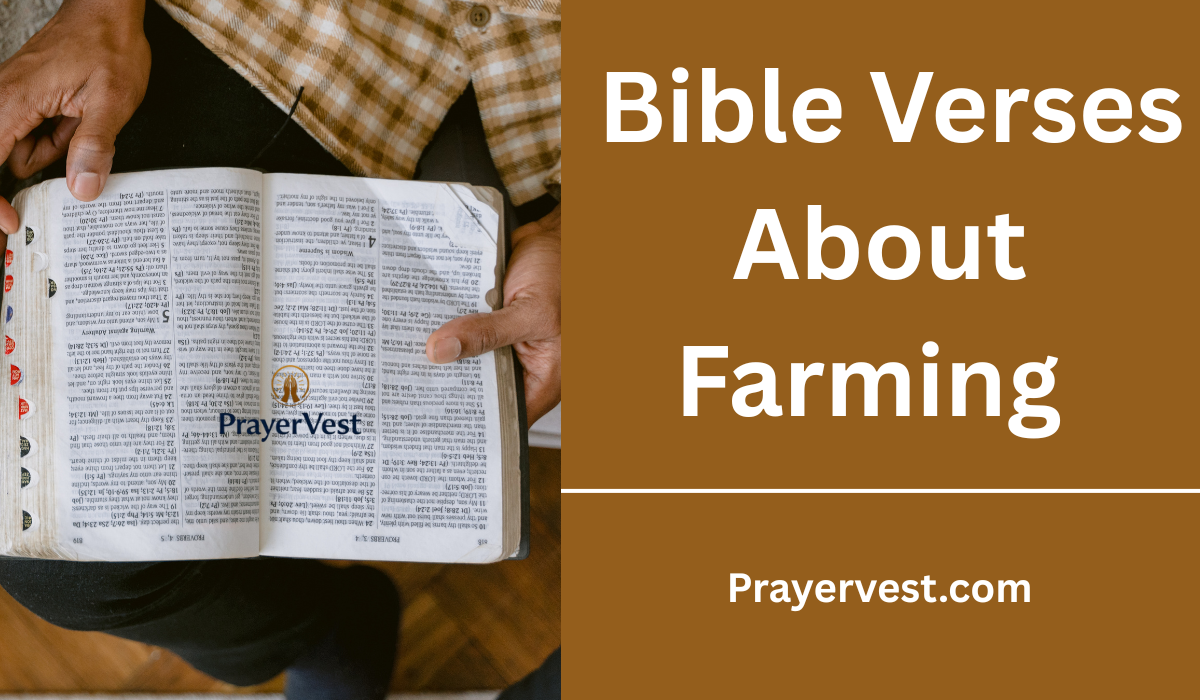In addition to being a way of life for many of God’s people, farming is also a spiritual image that is interwoven throughout the Bible. Farming imagery frequently conveys values of trust, perseverance, hard work, and reliance on God, from the sowing of seeds to the harvest of harvests.
The Bible serves as a reminder that although we can plant and water, God is ultimately the source of growth. These teachings guide us to a life of trust and hard work, demonstrating that believers are called to plant seeds of faith and righteousness in the same way that farmers toil in the fields.
God teaches spiritual lessons through farming throughout the Bible. Jesus frequently used parables about agriculture to explain how the kingdom of God expands from humble beginnings to bountiful harvests. Examples of these parables include the sower, the wheat and the tares, and the mustard seed. Images of farms serve as a reminder of tenacity, the value of strong spiritual ties, and the fruits of devoted work.
These passages demonstrate the eternal reality that blessings and fruitfulness come from hard effort and confidence in God, which applies to both farmers and non-farmers.


Bible passages on farming also inspire us to appreciate the earth and the provision it gives under God’s care. They emphasize how human accountability and divine providence work together: we till, plant, and nurture, but God provides the rain, sunshine, and growth. As a result, farming becomes more than just a job; it becomes a way to honor and care for God’s creation. In the field and in our spiritual lives, these verses serve as a reminder of the importance of hard work, perseverance, thankfulness, and trusting in God’s timing for the harvest.
Bible Verses About Farming (2026)
1. Genesis 1:28
“God blessed them and said to them, ‘Be fruitful and multiply; fill the earth and subdue it. Rule over the fish in the sea and the birds in the sky and over every living creature that moves on the ground.’”
From the very beginning, God established humanity’s role as stewards of the earth. This verse underscores the divine mandate to cultivate, manage, and care for creation responsibly. Farming, as part of this stewardship, becomes a sacred act of participating in God’s design. By working the land and tending to crops, humans fulfill a calling to multiply the resources of the earth while honoring God’s creation.
2. Genesis 4:2
“Now Abel kept flocks, and Cain worked the soil.”
This early depiction of agriculture and animal husbandry highlights the fundamental roles humans played in sustaining life. Farming here is shown as an honorable and necessary occupation, tied to survival, provision, and service. It teaches us that laboring on the land is both practical and spiritually significant, reflecting a partnership with God in nurturing the resources He has provided.
3. Proverbs 12:11
“Those who work their land will have abundant food, but those who chase fantasies have no sense.”
Proverbs emphasizes diligence and practical labor. In farming, the rewards are directly connected to the effort and care invested in the land. This verse reminds us that faithfulness in work—especially agricultural work—is a pathway to sustenance, stability, and blessing. It contrasts productive labor with idle pursuits, underscoring that commitment yields tangible results.
4. Leviticus 19:9-10
“When you reap the harvest of your land, do not reap to the very edges of your field or gather the gleanings of your harvest. Leave them for the poor and the foreigner.”
God’s instructions in this passage reflect His concern for justice, mercy, and community responsibility. Farming is not only about provision for oneself but also about generosity toward others. By leaving portions of the harvest for those in need, farmers participate in God’s plan of social equity and compassion, integrating spiritual principles into everyday work.
5. Psalm 65:9-10
“You care for the land and water it; you enrich it abundantly. The streams of God are filled with water to provide the people with grain, for so you have ordained it.”
This Psalm celebrates God’s provision and the rhythms of nature that sustain agriculture. Farming is depicted as a partnership with divine blessing, where human labor meets God’s care to produce abundance. Recognizing God’s hand in the growth of crops nurtures gratitude, humility, and trust in His provision for sustenance and life.
6. Deuteronomy 11:14
“Then I will send rain on your land in its season, both autumn and spring rains, so that you may gather in your grain, new wine and olive oil.”
This verse emphasizes the connection between divine blessing and agricultural success. God promises provision through seasonal rain, showing that farming relies not only on human effort but also on His timing and favor. Farmers are reminded to depend on God, work diligently, and trust His provision for fruitful harvests.
7. Proverbs 27:23-27
“Be sure you know the condition of your flocks, give careful attention to your herds; for riches do not endure forever, and a crown is not secure for all generations. When the hay is removed and new growth appears and the grass from the hills is gathered in, the lambs will provide you with clothing, and the goats with the price of a field.”
This passage underscores careful stewardship in farming and livestock management. Prosperity is tied to vigilance, planning, and responsible care of resources. It teaches that success in agriculture requires both diligence and foresight, reflecting the importance of tending God’s gifts wisely.
8. Ecclesiastes 11:4
“Whoever watches the wind will not plant; whoever looks at the clouds will not reap.”
Ecclesiastes reminds farmers not to be paralyzed by fear or over-caution. Effective farming requires action despite uncertainties in weather or market conditions. Trusting God and working faithfully in spite of unpredictability ensures that efforts are eventually rewarded, teaching faith in action alongside practical labor.
9. Isaiah 28:24-26
“When a farmer plows for planting, does he plow continually? Does he keep on breaking up and working the soil? When he has leveled the surface, does he not sow caraway and scatter cumin? Does he not plant wheat in its place, barley in its plot, and spelt in its field?”
Isaiah uses farming as an illustration of wisdom, diligence, and orderly planning. Just as a farmer follows careful steps in sowing and planting, people are encouraged to approach life and responsibilities with methodical care. Farming becomes a model for patience, skill, and obedience to God’s natural order.
10. Matthew 13:3-9
“A farmer went out to sow his seed. As he was scattering the seed, some fell along the path, some on rocky places, some among thorns, and some on good soil. But the seed that fell on good soil produced a crop—some a hundred, some sixty, some thirty times what was sown.”
Jesus uses the parable of the sower to connect farming with spiritual growth. Just as seeds need fertile soil to thrive, God’s Word requires receptive hearts to bear fruit. This passage teaches farmers and believers alike the principle of sowing with intention, care, and hope for a bountiful outcome.
11. Mark 4:26-29
“He also said, ‘This is what the kingdom of God is like. A man scatters seed on the ground. Night and day, whether he sleeps or gets up, the seed sprouts and grows, though he does not know how. All by itself the soil produces grain—first the stalk, then the head, then the full kernel in the head.’”
This parable emphasizes the mystery of growth in farming and in God’s kingdom. While human effort is necessary to sow, the ultimate growth and harvest come through God’s power. Farmers are reminded to work diligently yet humbly, trusting God to bring the increase in His perfect timing.
12. Luke 10:2
“He told them, ‘The harvest is plentiful, but the workers are few. Ask the Lord of the harvest, therefore, to send out workers into his harvest field.’”
Farming here becomes a metaphor for spiritual labor. Jesus equates fields of crops with fields of souls, showing that both require effort, diligence, and prayer. Just as a farmer depends on workers to gather crops, God’s work in the world requires willing hands to sow and reap His blessings.
13. 1 Corinthians 3:6-7
“I planted the seed, Apollos watered it, but God has been making it grow. So neither the one who plants nor the one who waters is anything, but only God, who makes things grow.”
Paul reinforces the partnership between human effort and divine provision. In farming and in life, our labor is important, but ultimate growth comes from God. This verse encourages humility, patience, and faith in God’s unseen work behind every successful harvest.
14. James 5:7
“Be patient, then, brothers and sisters, until the Lord’s coming. See how the farmer waits for the land to yield its valuable crop, patiently waiting for the autumn and spring rains.”
Patience is an essential virtue in farming. James uses agricultural imagery to illustrate endurance and faith in God’s timing. Just as farmers wait for the harvest, believers are called to patiently trust God, knowing that growth and reward require time and consistent care.
15. Revelation 14:15
“Another angel came out of the temple and called in a loud voice to him who was sitting on the cloud, ‘Take your sickle and reap, because the time to reap has come, for the harvest of the earth is ripe.’”
Even in prophetic vision, farming imagery communicates readiness and divine judgment. The harvest represents both the natural bounty and God’s ultimate plan. Farmers can see in this verse a spiritual reminder: diligence in work aligns with God’s greater purposes, and the cycles of sowing, growth, and reaping extend beyond the fields into eternal significance.
16. Hosea 10:12
“Sow righteousness for yourselves, reap the fruit of unfailing love, and break up your unplowed ground; for it is time to seek the Lord, until he comes and showers his righteousness on you.”
Hosea uses farming as a spiritual metaphor, linking sowing with righteous living. Just as farmers cultivate soil for a fruitful harvest, believers are called to cultivate their hearts and actions in alignment with God’s will. This verse encourages diligent spiritual work, assuring that a life sown in righteousness will yield abundant blessings.
17. Joel 2:23
“Be glad, people of Zion, rejoice in the Lord your God, for he has given you the autumn rains because he is faithful. He sends you abundant showers, both autumn and spring rains, as before.”
This passage highlights God’s faithfulness in providing the natural resources necessary for farming. Rain, vital for crops, is depicted as a tangible blessing from God. Farmers and believers alike are reminded to rejoice in God’s provision and trust His timing for abundance in both the fields and in life.
18. Amos 9:13
“The days are coming,” declares the Lord, “when the reaper will be overtaken by the plowman and the planter by the one treading grapes. New wine will drip from the mountains and flow from all the hills.”
Amos speaks of God’s blessings as overflowing and abundant, surpassing ordinary expectations. Farming imagery conveys the richness of God’s provision. For farmers, it serves as a reminder that diligence combined with God’s favor can yield extraordinary results beyond human planning or effort.
19. Matthew 9:37-38
“Then he said to his disciples, ‘The harvest is plentiful but the workers are few. Ask the Lord of the harvest, therefore, to send out workers into his harvest field.’”
This passage parallels spiritual work with farming. Jesus highlights the need for laborers to gather God’s harvest, illustrating that both agricultural and spiritual fields require diligence, commitment, and prayer. Farmers can see in this verse a call to recognize their own work as part of a larger divine plan.
20. John 4:35
“Don’t you have a saying, ‘It’s still four months until harvest’? I tell you, open your eyes and look at the fields! They are ripe for harvest.”
Jesus encourages awareness and readiness, using the metaphor of ripening fields. Just as a farmer must recognize when crops are ready, believers are called to discern opportunities for action and ministry. Farming imagery teaches vigilance, observation, and timely action in both agriculture and spiritual life.
21. 2 Chronicles 31:5
“As soon as the order went out, the Israelites generously gave the firstfruits of their grain, new wine, olive oil, honey, and all that the fields produced. They brought a great amount, a tithe of everything.”
This verse highlights gratitude and generosity in farming. Offering firstfruits acknowledges God as the ultimate source of provision. Farmers are reminded to honor God with their labor and harvest, integrating faithfulness into their work and recognizing blessings as a divine gift.
22. Psalm 107:37
“They sowed fields and planted vineyards that yielded a fruitful harvest.”
The Psalm celebrates the reward of diligent labor. Planting and tending fields result in abundance, symbolizing both physical sustenance and God’s favor. Farmers can draw encouragement from this verse, understanding that effort, perseverance, and trust in God lead to fruitful outcomes.
23. Isaiah 30:23
“He will also send you rain for the seed you sow in the ground, and the bread that comes from the produce of the land will be rich and plentiful.”
Isaiah underscores God’s role in agricultural success. Rain and fruitful harvests are framed as divine blessings, emphasizing the partnership between human effort and God’s provision. Farmers are reminded that productivity is both practical and spiritual, rooted in obedience and faith in God.
24. Jeremiah 2:21
“I had planted you like a choice vine of sound and reliable stock. How then did you turn against me into a corrupt, wild vine?”
Here, farming imagery illustrates spiritual and moral cultivation. Just as a vine must be nurtured to bear good fruit, individuals must maintain godly principles to flourish. This verse warns that neglect or rebellion can lead to corruption, reinforcing the importance of careful tending—both in farming and in spiritual life.
25. Ezekiel 36:29-30
“I will give you a new heart and put a new spirit in you; I will remove from you your heart of stone and give you a heart of flesh. Then you will follow my decrees and be careful to keep my laws. You will plant vineyards and get plenty of fruit from them.”
God promises renewal and blessing, symbolized through fruitful vineyards. Farming here represents the transformative power of God’s Spirit, producing growth and abundance in life. Farmers and believers alike are reminded that prosperity flows from alignment with God’s will.
26. Hosea 2:21-22
“I will betroth you to me forever; I will betroth you in righteousness and justice, in love and compassion. I will betroth you in faithfulness, and you will acknowledge the Lord.”
Though not directly about crops, Hosea’s imagery of betrothal and cultivation mirrors farming principles—care, patience, and nurturing. God’s relationship with His people is likened to tending soil, sowing seeds, and expecting growth, reinforcing lessons of diligence and divine partnership.
27. Malachi 3:10
“Bring the whole tithe into the storehouse, that there may be food in my house. Test me in this,” says the Lord Almighty, “and see if I will not throw open the floodgates of heaven and pour out so much blessing that there will not be room enough to store it.”
This verse connects farming with generosity and obedience. Bringing tithes from the harvest demonstrates faith, and God’s response is abundant blessing. Farmers are reminded that giving from their labor opens the door to divine favor and prosperity.
28. Matthew 13:23
“But the seed falling on good soil refers to someone who hears the word and understands it. This is the one who produces a crop, yielding a hundred, sixty, or thirty times what was sown.”
The parable of the sower reinforces the principle of fruitful outcomes when effort meets the right conditions. Farmers understand that soil quality, care, and diligence affect yield, just as spiritual receptiveness affects growth. This verse encourages intentional cultivation, both in land and in life.
29. Luke 8:15
“But the seed on good soil stands for those with a noble and good heart, who hear the word, retain it, and by persevering produce a crop.”
Persistence and perseverance are emphasized here. Farming requires continuous care and patience, reflecting the same virtues needed for spiritual growth. Just as careful tending ensures a productive harvest, steadfastness in faith ensures lasting spiritual fruit.
30. John 15:1-2
“I am the true vine, and my Father is the gardener. He cuts off every branch in me that bears no fruit, while every branch that does bear fruit he prunes so that it will be even more fruitful.”
Farming imagery illustrates God’s guidance and pruning for maximum productivity. Just as a gardener shapes vines to produce more fruit, God shapes lives to increase spiritual and practical fruitfulness. This verse reminds farmers and believers that growth often involves discipline and refinement under God’s care.
31. Psalm 104:14
“He makes grass grow for the cattle, and plants for people to cultivate—bringing forth food from the earth.”
This verse celebrates God as the ultimate provider, sustaining both humans and animals. Farming becomes a divine partnership, where humans cultivate the plants God provides. Recognizing God’s hand in every crop nurtures gratitude, humility, and respect for the natural resources entrusted to us.
32. Proverbs 13:23
“A poor person’s field may produce abundant food, but injustice sweeps it away.”
Proverbs reminds us that diligence alone is not enough; integrity and justice are essential for lasting success. Farmers are called to work honestly and ethically, trusting that God blesses those who act rightly. The verse teaches that moral conduct ensures the sustainability and blessing of one’s labor.
33. Isaiah 55:10-11
“As the rain and snow come down from heaven, and do not return to it without watering the earth and making it bud and flourish, so that it yields seed for the sower and bread for the eater, so is my word that goes out from my mouth.”
Farming imagery illustrates God’s faithfulness and the power of His Word. Just as rain ensures a harvest, God’s Word produces fruit in the hearts of those who receive it. Farmers see a parallel between nurturing crops and nurturing spiritual life—both require patience, care, and trust in God’s provision.
34. Ezekiel 34:12
“As a shepherd looks after his scattered flock when they are withered and weak, so will I look after my sheep.”
Although this verse speaks of shepherding, the imagery connects to agricultural care and responsibility. Farmers are reminded that tending land or livestock is a sacred act of stewardship. God watches over His creation and those who labor faithfully, offering protection, guidance, and blessing.
35. Jeremiah 31:12
“They will come and shout for joy on the heights of Zion; they will rejoice in the bounty of the Lord—the grain, the new wine, and the olive oil, the young of the flocks and herds. They will be like a well-watered garden, and they will sorrow no more.”
Farming here represents God’s abundant blessing and provision. Grain, oil, and livestock symbolize sustenance, joy, and prosperity. Farmers are reminded that their labor, when aligned with God’s favor, results in abundance that sustains not only themselves but also their communities.
36. Hosea 8:7
“They sow the wind and reap the whirlwind. The stalk has no head; it will produce no flour. Were it not for the LORD, they would not have flour on the threshing floor, nor grain in the storehouses.”
Hosea warns that unwise or dishonest practices in farming—or life—lead to loss. Success is ultimately dependent on God’s blessing. Farmers are encouraged to seek God’s guidance, work diligently, and avoid shortcuts that compromise integrity or sustainability.
37. Amos 8:4-5
“Hear this, you who trample the needy and do away with the poor of the land, saying, ‘When will the New Moon be over that we may sell grain, and the Sabbath be ended that we may market wheat?’—skimping on the measure, boosting the price and cheating with dishonest scales.”
Amos highlights fairness in agriculture and commerce. Farming is not just physical labor but also a moral responsibility. Ethical practices in sowing, harvesting, and selling crops honor God and ensure the wellbeing of the community.
38. Micah 6:15
“You will sow but reap only a little; you will plant vineyards but not drink the wine; you will work for wages but never enough to satisfy. You will eat, but never have your fill; you will store up, but save nothing, because of the sword of your enemies.”
Micah warns that neglecting God or acting unjustly can undermine even the most diligent farming efforts. The verse serves as a reminder that prosperity is tied to obedience, ethical conduct, and reliance on God’s guidance. Farmers must align work and life with His principles.
39. Haggai 1:6
“You have planted much, but harvested little. You eat, but never have enough. You drink, but never have your fill. You put on clothes, but are not warm. You earn wages, only to put them in a purse with holes in it.”
Haggai addresses misprioritization in labor and resources. Despite physical effort, neglecting God and His purposes results in unfruitful work. Farmers are reminded that aligning their labor with God’s priorities brings both spiritual and material abundance.
40. Zechariah 8:12
“The seed will grow well, the vine will yield its fruit, the ground will produce its crops, and the heavens will drop their dew. I will give all these things as an inheritance to the remnant of this people.”
Zechariah concludes with a promise of blessing and restoration. God assures that diligence in farming, coupled with faithfulness, will yield abundant provision. This verse inspires farmers to trust God’s faithfulness, knowing their labor contributes to His greater plan and brings lasting blessing.
Conclusion
Finally, we learn important lessons about faith, hard work, and reliance on God from Bible verses concerning farming. The spiritual idea that growth takes time and calls for patience and effort is illustrated through the imagery of planting, watering, and harvesting. Believers are called to plant seeds of righteousness, love, and service, trusting that God will bear fruit in His perfect time, much like a farmer expects God to provide increase after working in the fields. These verses serve as a reminder that although human effort is required, God’s providence is ultimately responsible for progress and blessing.
Additionally, in the Bible, farming is a metaphor for patience, thankfulness, and stewardship. The teachings of cultivation can be applied to husbands, spouses, and kids alike, who should carefully manage the opportunities, relationships, and resources that God gives them. We can learn practical and spiritual lessons from these Scriptures, such as how to work hard, remain patient in the face of adversity, and celebrate when God’s blessings materialize. Farming teaches us to work alongside God to create a fruitful and dependable life, making it more than just a means of subsistence.






